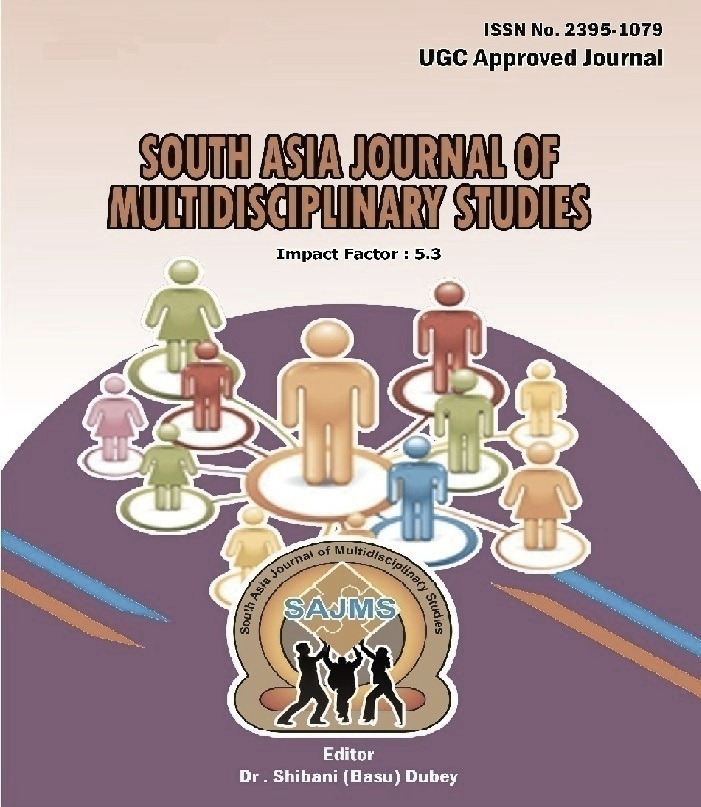ICT MEDIATED TEACHING LEARNING PEDAGOGY AND ITS EFFECTS
Keywords:
ICT, Innovations in teaching, technological advancements, Online Teaching- LearningAbstract
In this Paper, the author has discussed about the various teaching, learning techniques of ICT andtheir effects in various teaching-Learning situations. The author has also discussed how Covid-19
pandemic paved the way for ICT mediated teaching- Learning environment and brought in use of
various virtual platforms in regular practice. In other words, use of technological innovations is
dominating the entire process of teaching and learning and can bring in positive changes but cannot
replace teachers, but teachers who can keep themselves abreast of technological advancements will
surely be replaced by those teachers.
References
Dias, L.B.(1999).Integrating technology. Learning and Leading with Technology, Vol. 27 No 3
Garavaglia, A., Garzia, V. & Petty, L.(2012). Quality of learning environment in digital
classrooms: An Italian case study. Procedia-Social and BehaviouralSciences,Vol46,17351739.
Garg, P. & Gill, S.(2009). ROLE OF ICT IN ENHANCEMENT OF LEARNING ABILITY
AND
BASIC CONCEPTS OF
SCIENCE
AMONG
SECONDARY
SCHOL STUDENTS. Journal of Education and Pedagogy,Vol1, No.1, 63-67.
Gerard, L. F. ,Bowyer, J.B. & Linn, M.C.(2008). Principal Leadership for Technology
enhanced Learning in Science. Journal of Science Education and Technology, Vol. 17, No. 1
(FEBRUARY ) , 1-18.
Herig, R.G.M. (2004). Technology and Its Impact in the classroom. Computers and Education
Vol. 42, 111-131.
https://www.ibm.com/topics/what-
isblockchain#:~:text=Blockchain%20defined%3A%20Blockchain%20is%20a,patents%2C%20
cop
Kay, R. (2011). Exploring the Impact of Web-Based Learning Tools in Middle School
Mathematics and Science Classrooms. Journal of Computers in Mathematics 7 Science
Teaching, Vol.30, No.2, 141-161.
Kengam, J.(2020) Artificial Intelligence in Education retrieved on 11/03/2023
https://www.researchgate.net/publication/347448363
King, K. P. ( 1999). The Motion Picture in Science Education: "One Hundred Percent
Efficiency". Journal of Science Education and Technology, Vol. 8, No. 3 (Sep.) , 211226.
Kumar, D. & Wilson, C.L. (1997). Computer Technology, Science Education, and
Studentswith Learning Disabilities. Journal of Science Education and Technology, Vol. 6,No. 2
(Jun.), 155-160.yrights%2C%20branding).
Kumar, D.D, Helgeson, S.L. & White, A.L. (1994). Computer Technology-Cognitive
Psychology Interface and Science Performance Assessment Educational Technology Research
and Development, Vol. 42, No. 4, 6-16
Okojie, M. CPO., Olinzock, A.A., Okojie-Boulder, T.C. (2005). The Pedagogy of Technology
Integration. The Journal of Technology Studies , 66-71.
D.M. and Castillo H.F.(Eds), 21 st Century Tech Trends: Higher Education, pp 95-104. Amitesh
Publishers, Pune.
Siemens, G., and Gasevic, D. (2012). Guest Editorial-Learning and Knowledge Analytics. J.
Sobha, V.K. (2010). Computer Games and Problem Solving Ability Of Students. GCTE
Journal of Research and Extension in Education, Vol 5, No.2,92-97
Susan,T.A.(2008).MULTIMEDIA PACKAGES: RELEVANCE FOR EFFECTIVE
EVALUATION. International Educator, Vol 20,No.2,26-30
Vaidya, M. & Upadhyaya, H.(2015).Effectiveness of EducompSmartclass Program in terms of
Intelligence and Academic Achievement of Middle level School Students.
Research Journal: Humanities and Social Science, Vol. 6, No.3, 223-226.
Vrasidas G & Kyriakou, E. (2008). Integrating technology in the classroom
The Graduate School. University of Wisecons in-stout.
Amutha, S. (2010). Effect of E-Content on the achievement of Biology among Secondary
Students. Psycho-Lingua, Vol 40, No. 1 & 2, 183-186.
Bahudaria, M., Gupta, D. & Gupta, K. (2010).EFFECT OF COMPUTER AIDED TEACHING
ON PERFORMANCE IN SOCIAL SCIENCE. Psycho-Lingua, Vol 40, No 1&2.169- 172.
Berlin, D.F. & White, A.L. (1995). Using Technology in Assessing Integrated Science and
Mathematics Learning. Journal of Science Education and Technology, Vol. 4, No. 1 (Mar.) ,
-56.
Cepni, S., Tas, E. & Kose,S.(2004). The effects of computer-assisted materials cognitive levels,
misconceptions and attitudes towards science Computers & Education, vol 46,192-205.
Published
Issue
Section
License
Submission Preparation ChecklistSubmission Preparation Checklist
Before proceeding with your submission, please ensure that you have completed the following checklist. All items on the list must have a checkmark before you can submit your manuscript:

